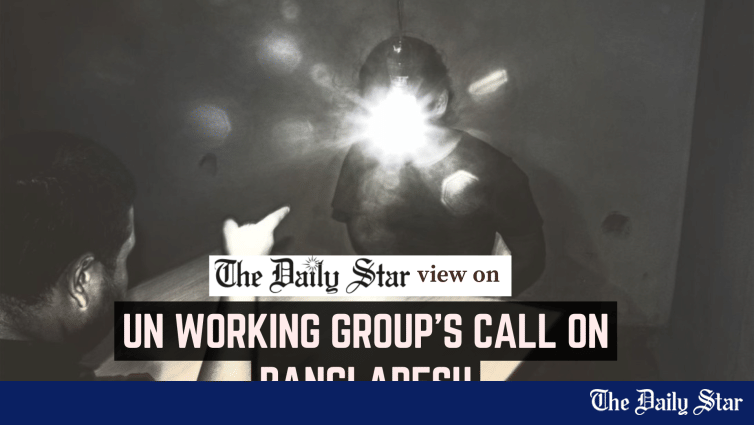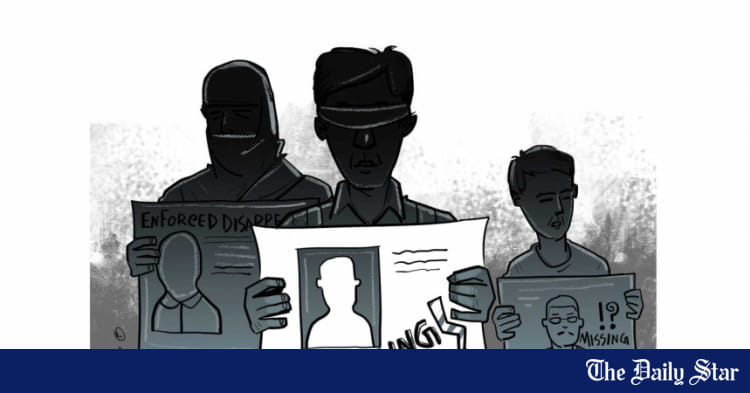Saif
Senior Member
- Messages
- 17,442
- Likes
- 8,381
- Nation

- Residence

- Axis Group


ENFORCED DISAPPEARANCE: Commission members, survivors face threats
The Commission of Inquiry on Enforced Disappearance in its second interim report revealed that its members and surviving victims were facing various challenges, including intimidation, threats, and other obstacles.
 www.newagebd.net
www.newagebd.net
ENFORCED DISAPPEARANCE: Commission members, survivors face threats.
Tanzil Rahaman 28 June, 2025, 00:27

The Commission of Inquiry on Enforced Disappearance in its second interim report revealed that its members and surviving victims were facing various challenges, including intimidation, threats, and other obstacles.
Several commission members and surviving victims said that they were intimidated and put under surveillance by members of the forces that were involved in incidents of enforced disappearance during the ousted Awami League regime.
The challenges faced by the commission have been multifaceted and, at times, deeply obstructive, according to a part of the report shared by the chief adviser’s press wing on June 23.
‘The Commission members have faced sustained intimidation, both directly and indirectly. Threats have been issued in person, by phone, and through online communication channels. They have been subjected to systematic harassment, slander, and public disinformation campaigns. Accusations have ranged from being agents of foreign intelligence services, such as Pakistan’s Inter-Services Intelligence, India’s Research and Analysis Wing and USA’s Central Intelligence Agency, to being religious or political extremists,’ said the report.
During some interviews, the report said, alleged perpetrators have explicitly stated that they were monitoring the families of commission members.
‘These efforts at intimidation, however, have not affected the direction or pace of our work. We have treated such provocations with the disregard they deserve and continued our efforts in full commitment to the victims and our mandate,’ it added.
The Directorate General of Forces Intelligence, Rapid Action Battalion, police, Detective Branch of police, Counter Terrorism and Transnational Crime, and Criminal Investigation Department were allegedly involved in enforced disappearance incidents, according to the commission.
Commission member Nabila Idris told New Age on Friday that they did not face such threats in the early days of their work as alleged perpetrators in security forces then largely ignored the commission and its activities.New age fashion
‘All members of the commission did not face such threats and intimidations. But the number of members that faced threats and obstacles is multiple. They have faced threats and intimidation from members of security forces,’ explained Nabila.
The report said that surviving victims also faced numerous obstacles.
‘If we bring them (surviving victims) under the public gaze, for instance, during high-profile visits, such as those of the chief adviser to the secret detention centres in February 2025, we take care to ensure that they are prepared for the subsequent pressure they may face. And victims have indeed demonstrated resilience,’ the report said.
The report further said that sustained public attacks and online harassment from political entities, particularly affiliates of the Awami League, had exacted a psychological toll on them.
‘Even those victims who had appeared ready to face scrutiny later reported significant mental distress following such targeted backlash. Conversely, when we do not bring some victims in the public eye, sometimes they feel as if they are being sidelined,’
Another commission member and human rights activist, Nur Khan Liton, alleged that perpetrators in all forces were threatening members and subjected surviving victims to surveillance.
United People›s Democratic Front leader Maichel Chakma, also a surviving victim, alleged that he was forced to switch off his mobile phone to avoid surveillance of intelligence agencies.
‘In the first week of June, I came to know from a close source in an intelligence agency that I am now under surveillance,’ Maichel told New Age on Friday.
Quoting the intelligence member, Maichel said that he was doing excesses according to members of that intelligence agency and was now under surveillance of the agency.
He, however, did not disclose the name of the agency.
Co-founder Sanjida Islam Tulee of Maayer Daak, a platform of families of victims of enforced disappearances, said that surviving victims were facing threats and intimidations.
‘I have heard that several incidents took place in Dhaka and Chattogram. Our family has also faced intimidation,’ Tulee said.
Home adviser retired Lieutenant General Jahangir Alam Chowdhury could not be reached for comment despite several attempts. The interim government formed the commission following the ouster of Sheikh Hasina-led government on August 5 past year amid a student-led mass uprising.
The commission claimed that it had so far found proof and documents of 253 incidents of enforced disappearance out of the 1,850 allegations they had received.
The incidents of these enforced disappearance occurred during the Awami League regime between January 6, 2009 and August 5, 2024, according to the commission.
Tanzil Rahaman 28 June, 2025, 00:27
The Commission of Inquiry on Enforced Disappearance in its second interim report revealed that its members and surviving victims were facing various challenges, including intimidation, threats, and other obstacles.
Several commission members and surviving victims said that they were intimidated and put under surveillance by members of the forces that were involved in incidents of enforced disappearance during the ousted Awami League regime.
The challenges faced by the commission have been multifaceted and, at times, deeply obstructive, according to a part of the report shared by the chief adviser’s press wing on June 23.
‘The Commission members have faced sustained intimidation, both directly and indirectly. Threats have been issued in person, by phone, and through online communication channels. They have been subjected to systematic harassment, slander, and public disinformation campaigns. Accusations have ranged from being agents of foreign intelligence services, such as Pakistan’s Inter-Services Intelligence, India’s Research and Analysis Wing and USA’s Central Intelligence Agency, to being religious or political extremists,’ said the report.
During some interviews, the report said, alleged perpetrators have explicitly stated that they were monitoring the families of commission members.
‘These efforts at intimidation, however, have not affected the direction or pace of our work. We have treated such provocations with the disregard they deserve and continued our efforts in full commitment to the victims and our mandate,’ it added.
The Directorate General of Forces Intelligence, Rapid Action Battalion, police, Detective Branch of police, Counter Terrorism and Transnational Crime, and Criminal Investigation Department were allegedly involved in enforced disappearance incidents, according to the commission.
Commission member Nabila Idris told New Age on Friday that they did not face such threats in the early days of their work as alleged perpetrators in security forces then largely ignored the commission and its activities.New age fashion
‘All members of the commission did not face such threats and intimidations. But the number of members that faced threats and obstacles is multiple. They have faced threats and intimidation from members of security forces,’ explained Nabila.
The report said that surviving victims also faced numerous obstacles.
‘If we bring them (surviving victims) under the public gaze, for instance, during high-profile visits, such as those of the chief adviser to the secret detention centres in February 2025, we take care to ensure that they are prepared for the subsequent pressure they may face. And victims have indeed demonstrated resilience,’ the report said.
The report further said that sustained public attacks and online harassment from political entities, particularly affiliates of the Awami League, had exacted a psychological toll on them.
‘Even those victims who had appeared ready to face scrutiny later reported significant mental distress following such targeted backlash. Conversely, when we do not bring some victims in the public eye, sometimes they feel as if they are being sidelined,’
Another commission member and human rights activist, Nur Khan Liton, alleged that perpetrators in all forces were threatening members and subjected surviving victims to surveillance.
United People›s Democratic Front leader Maichel Chakma, also a surviving victim, alleged that he was forced to switch off his mobile phone to avoid surveillance of intelligence agencies.
‘In the first week of June, I came to know from a close source in an intelligence agency that I am now under surveillance,’ Maichel told New Age on Friday.
Quoting the intelligence member, Maichel said that he was doing excesses according to members of that intelligence agency and was now under surveillance of the agency.
He, however, did not disclose the name of the agency.
Co-founder Sanjida Islam Tulee of Maayer Daak, a platform of families of victims of enforced disappearances, said that surviving victims were facing threats and intimidations.
‘I have heard that several incidents took place in Dhaka and Chattogram. Our family has also faced intimidation,’ Tulee said.
Home adviser retired Lieutenant General Jahangir Alam Chowdhury could not be reached for comment despite several attempts. The interim government formed the commission following the ouster of Sheikh Hasina-led government on August 5 past year amid a student-led mass uprising.
The commission claimed that it had so far found proof and documents of 253 incidents of enforced disappearance out of the 1,850 allegations they had received.
The incidents of these enforced disappearance occurred during the Awami League regime between January 6, 2009 and August 5, 2024, according to the commission.







